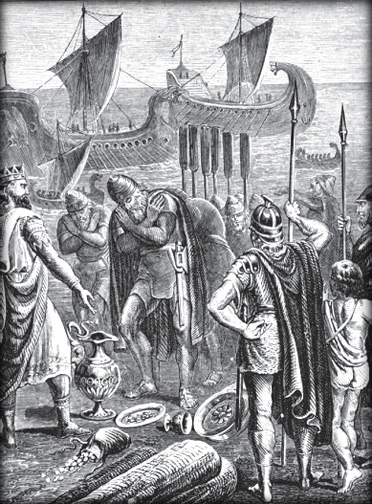The lost world of the Phoenicians
by Amal Hewavissenthi
Whether or not they reached America, the Phoenicians write a chapter
in history that is fabulous enough. They were a people by no means as
mysterious as they have been generally regarded, a people who rightly
rank beside the Greeks and the Romans as the “builders of the Western
world.”
George Rawlinson characterised the Phoenicians as “the great pioneers
of civilisation” who by their boldness, their intrepidity and their
manual dexterity, prepared the way ... They adventured ... where none
had ever gone before ...” Yet in the end, they had to submit.
|

Phoenicians bring treasure to King Solomon |
Assyria, Babylonia and Persia took their tribute and levelled their
cities time and again while Alexander in the east and the Romans in the
west finally submerged them as an independent nation.
Tradition
As tradition has it, all this occurred nearly 3,000 years ago, in the
golden age of an astonishing people who roved the Mediterranean from end
to end, who taught the Hebrews how to build temples, the Greeks, to
write with phonetic characters and the Romans to fight at sea.
From a small number of tiny city-kingdoms (Tyre, Sidon, Beirut,
Bablos), the Phoenicians sailed and rowed the most advanced ships of
their period to the boundaries of the known world and beyond. They grew
rich on commerce, on hewing the timber from their mountains, on skilful
working of bronze and iron and glass, gold and ivory, on dyeing cloth
purple with an extract of sea snails. They traded with the Pharaohs of
Egypt, brought King Solomon's gold from Ophir, battled for Xerxes
against the Greeks, were besieged by Nebuchadnezzar and Alexander the
Great and Sent Hannibal to beset the Romans in their own land.
From about 12th century BC, to the razing of Carthage in the 1st
century BC, the Phoenicians added to history and legend a 1,000 years,
of daring voyages of sure genius in trade and diplomacy. Then they fell
sub merged by more militant empires. One great difficulty is that
virtually no histories or literature of Phoenicians survive and what is
generally known of them comes from others, chiefly from their enemies.
Legend of Elissa
The romantic story of Elissa of Tyre may well be true. As the legend
has it, she fled from her murderous brother King Pygmalion and
accompanied by priests and temple maidens of Astarte, she sailed west
from Cypruss to the Gulf of Tunis, There, on the hill top now called the
Byrsa, she founded the city of Carthage.
Elissa was a Phoenician princess and her story is balanced on reality
and myth. But the Phoenicians were very real indeed and they were the
greatest sailors and the explorers of the world. The first Phoenician
city was Byblos which called itself the oldest city in the world and was
the most important place which trakes its history as far back as 7,000
years.
Emir Maurice Chehab, Director General of Antiquities of Lebanon says
“Then about 1,200 BC, the “mysterious people of the sea” arrived. No one
yet knows just who they were. They toppled the Hit-tites, destroyed
Ugarit on the Syrian coast and swept South until stopped by Ramesses III
Pharaoh of the waning Egypt...” The Phoenicians were a mixture of
peoples and they became a nation on their own. It was really a time of
independence and energy, of a new form of writing, of long voyages and
colonies which had been established as far away as Spain. Until
Alexander of Macedon marched into Asia in 334 BC and the Romans rose to
power in the west, the Phoenicians prospered and expanded the world's
boundaries. They used symbols to write the sounds of their ancient
Semitic language and exactly where that alphabet was invented is still a
mystery.
The language consisted of 22 symbols each standing for a distinctive
sound rather than a word, a thought or a phrase. The use of papyrus
however explains why virtually no Phoenician writing, no history, no
trading records have come down to us. In their cities by the sea with
air and soil damp, papyrus mouldered and rotted away. Thus disappeared
the literature of a people who taught the world to write.
Phoenician kingdoms such as Sidon were broadly known in Homer's time.
In the epic Iliad, Homer called Phoenicians “well skilled in deft
handiwork”.
He described a Phoenician silver bowl as “the goodliest in all the
earth”. Later in the Odyssey he was somewhat cynical of Phoenicians.
“Thither came Phoenicians - men famed for their ships, greedy knaves,
bringing countless trinkets”.
Phoenicians in pursuit of trade usually hugged coasts choosing
landing places on easily defended islands or peninsulas.
During major crossings they steered by sun and stars and once ashore,
the Phoenician traders spread out purple cloth, glass trinkets, and
perfumed ointments.
Then they withdrew until the inhabitants brought adequate gold or
other valuables and the best trading points eventually became Phoenician
settlements.
Outbid
Eventually, Phoenicians met their match. The Greeks in the east
outbid them in trade and outfought them on the sea. In the west, Romans
had Carthaginion vessels as the prototype to build their own navy and
finally wiped out Phoenician power in Africa.
Yet even today, Lebanese descendants of the Phoenicians carry on as
entrepreneurs in practically every capital of the world.
Phoenician traders (today we call them Lebanese) have flourished
through most of the centuries since then and still flourish in such
cities as Paris, London, Sao Paulo, Singapore, New York and Sydney. |

